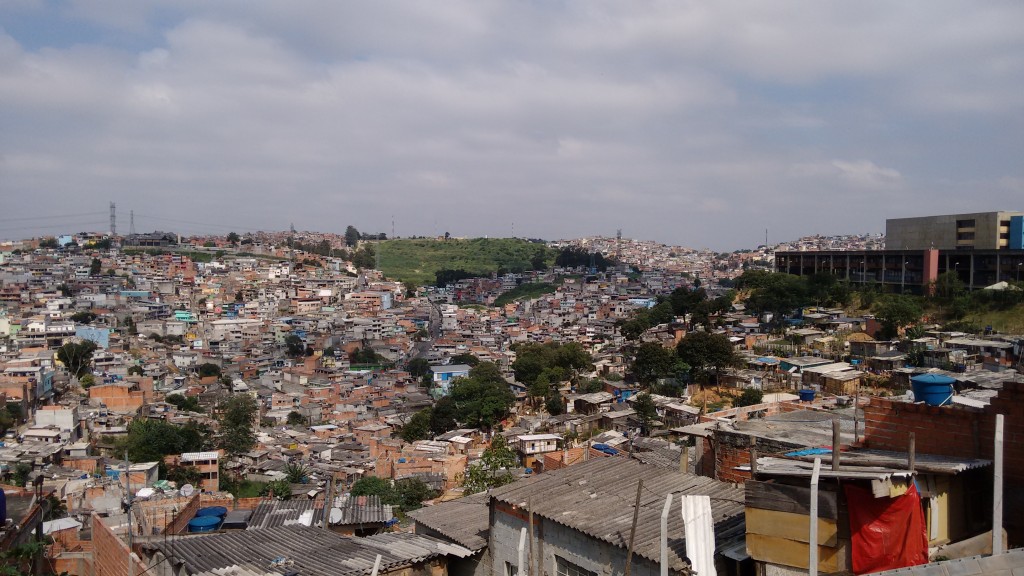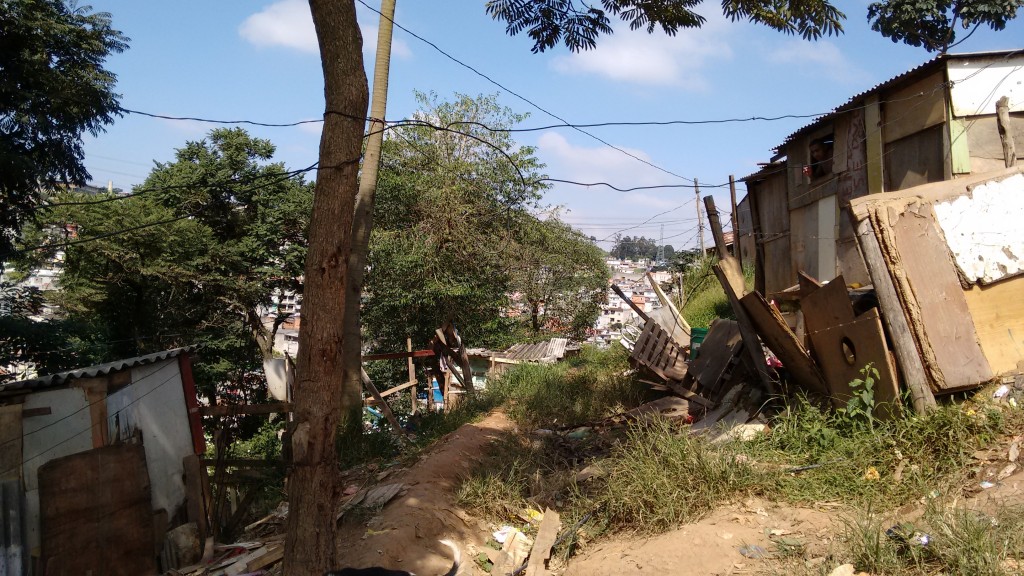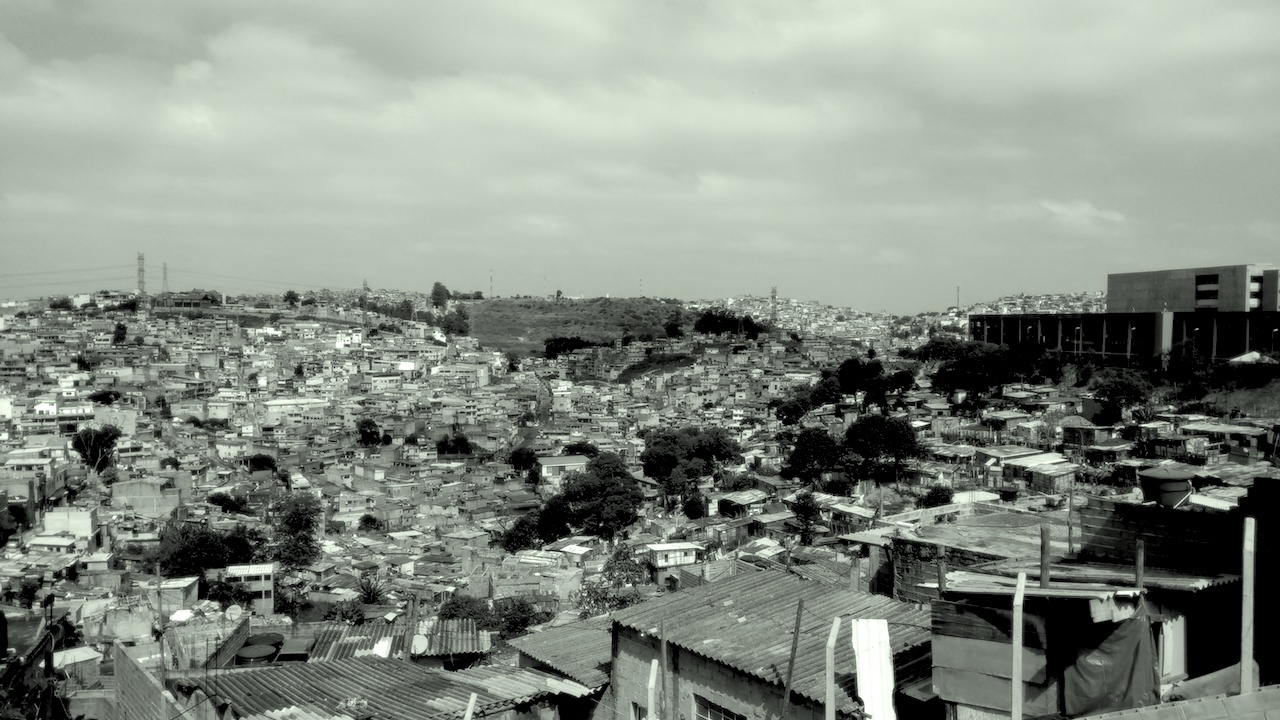The Guardian kicked off a week of coverage about São Paulo today, as part of its Rockefeller Foundation sponsored “Cities” Series. Although part of this content appears to be generated with support from local news non-profit Agência Publica and respectable local journalists like Leonardo Sakamoto, the series opens with erroneous information.
Today’s headline says, reads “An unprecedented wave of illegal occupations of abandoned property has transformed Brazil’s Megacity. Join us as we report from them and other sites in São Paulo”.
There are two basic mistruths represented here, one which suggests that São Paulo, a city in which approximately 16% of the population lives in favelas, is suffering from a kind of Malthusian nightmare of demographic explosion- an “unprecedented wave” of growth, and the second, that favela residents are criminals engaged in illegal land occupations.

CDHU Favela in Brasilandia. After the state government failed to deliver on its legal obligation of public housing construction, citizens occupied the proposed project’s land and built their own houses
First of all, it is important to note that São Paulo’s population growth has been stable for a quarter century. Like many southeastern cities in Brazil, São Paulo did undergo an unprecedented wave of growth as the city suffered massive demographic expansion from around 1940-1990. During this time, illegal land grabs by wealthy cattle ranchers, conducted in a process called grilhagem, coupled with a series of devastating droughts in Brazil’s impoverished Northeast caused a massive wave of migration to the cities in the southeast. São Paulo saw its population grow from 1.3 million to around 9.5 million during this period. There is no city in the world that would be capable of undergoing a 7-fold population increase in 50 years without social problems, and as the government struggled to catch up with its population in terms of utilities delivery, roads and housing, the number of informal settlements, called favelas, skyrocketed. After 50 years of double and triple digit population growth per decade, from 1990 forward it dropped down to the single digits. Most population growth from this point forwards is caused by the birthrate as opposed to rural migration, as 84% of the nation’s population now lives in cities. Whereas in the 1960s São Paulo’s population jumped from 2.7 to 5.9 million, from 2000-2010 its population rose from 10.4 to 11.2 million. This trend is also reflected in the slowing per capita increase in favela residents in the greater São Paulo area. From 1990 to 2000, the percentage of Greater São Paulo residents living in favelas grew from 5.72 to 8.14%. From 2000-2010 this growth rate slowed as the percentage grew from 8.14-9.79%. In short, contrary to the Guardian headline, what São Paulo is actually experiencing is a slowing in the growth rate of informal land occupations in the São Paulo metropolitan area.
A second point, which a lot of foreign journalists seem to have a problem understanding, is that occupation of unproductive land is completely legal in Brazil. Calling most favela residents “illegal land occupants”, be it out of ignorance or slander, effectively criminalizes the poor and middle class people who live there.
During the late 1980s as Brazil prepared its first constitution after the dictatorship period, it opened a process for people’s amendments. Any group that could get over 1 million signatures was able to insert an amendment in the new constitution. A coalition of academics and social movement activists mobilized and successfully created amendments 182 and 183 of the Brazilian constitution. These amendments stipulate that the social function of property in Brazil overrides the profit motive. According to these amendments, any Brazilian citizen who owns no land of his own has a right to squat on land that is not fulfilling its social function and sue for ownership. This includes vacant government-owned land and private sector owned land in which the owners haven’t paid their real estate taxes. The coalition that formed during the creation of the people’s amendments 182 and 183 became known as the Fórum Nacional de Reforma Urbana (National Urban Reform Forum/FNRU) and during the years that followed ratification of the amendments it pushed through a series of innovative national laws to guarantee that the amendments were properly adhered to. In the Federal Statute of the Cities of 2001, mechanisms of appropriation are established for unproductive privately owned land. In the case where squatters occupy an abandoned lot or building who’s owner is illegally refusing to pay his taxes, the city government appropriates the property by paying the owners market rate, minus the back taxes owed and a fine, and is legally obligated to help develop the property for low income housing.
I spent 5 years in the directorate of the Fórum Nacional de Reforma Urbana, and lived or worked in Brazilian favelas for nearly 20 years. The vast majority of favelas I lived in or visited are entirely legal. Most favelas are created in a coordinated action by a group of landless poor who methodically search for and legally verify the non-productive status of a plot of government or private sector owned land, as was the case of a community I spent time in inside of Jardim Fontalis favela, on São Paulo’s North Side, in 2015. The local activists poured through state government records and discovered a 50 hectare plot of land that was allocated for public housing construction in the 1980s and had sat vacant ever since. As in the case of most new favelas in São Paulo, they moved in and built wooden shacks, not because they could not afford brick houses, but to lower their risk in case of illegal forced evictions at the hands of the military police, who do everything they can to ignore the Statute of the City. As they occupied the land, they sued the state government for violation of articles 182 and 183 of the constitution, and filed a motion for dissapropriation. Now they are waiting, in what promises to take several years, for the state government to either hand over the land or relocate the squatters into public housing. In short, the criminals in this process, which repeats itself over and over in Brazil’s cities every year, are the rich: the governments and real estate speculators. It is not a crime for poor citizens to fight for their constitutional rights.

Squatters typically build wooden shacks as opposed to brick houses while waiting to legalize their land, as a risk reduction measure.
Brazil’s innovative laws that treat housing as a basic human right are an obvious thorn in the side of the real estate speculation industry, because unlike in cities in the US or England, the traditional slum lording tactic of land-banking becomes illegal. One could see how a newspaper which gets a lot of advertising from the real estate industry would want to obfuscate the legal right of Brazilian citizens to appropriate land from the rich.
In conclusion, neither is there an “unprecedented wave” of favela construction going on in São Paulo, nor is the process of building a favela typically illegal. Why would the Guardian imply otherwise? On it’s page about sponsors, it claims that its cities project is editorially independent from the Rockefeller Foundation which funds it. Could this sensationalist headline that criminalizes São Paulo’s poor be merely made out of ignorance?
[qpp]

